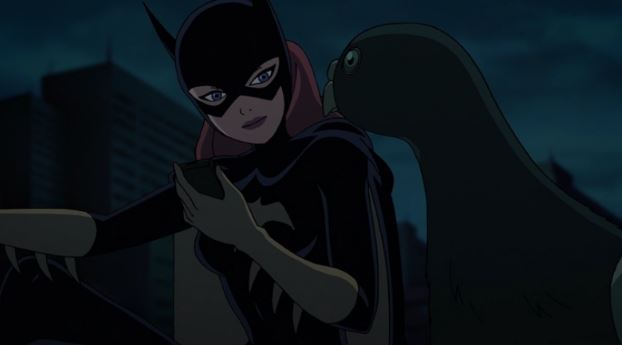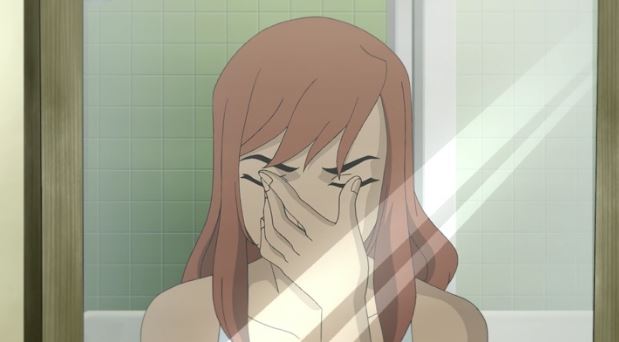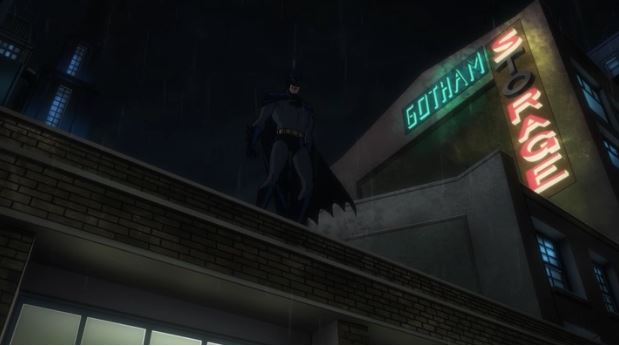LadyCentric Reviews: The Killing Joke (Part 1)
Due to the length of this review and how the film is so clearly broken into two parts, I will be posting part 1 today, with part 2 to follow up in a few days.
Part 1: Batgirl and her Insufferable Feelings!

I was never a huge fan of The Killing Joke. It was sold to me as “the ultimate Joker story” back when I was only just starting to read mainstream comics. I found it disturbing, and confusing. Fans of the book might argue that I wasn’t ready to read it, that I wasn’t knowledgeable enough about the DC universe to “get” it. Well, I simply decided that I liked my Joker animated and went back in search of other stories that I would find were more to my taste.
Fast forward several years. I discovered that not only would DC Animation be releasing a film version of The Killing Joke, but they would also casting Mark Hamill as the Joker. This is my Achilles heel. I made it a point to watch it and see how I would feel about it so many years after reading the original story.
I’ve read that there are people out there who have found the film to be a complete failure. And while I will agree that there are some very serious problems with the narrative, characterizations, and even style choices, I am reluctant to throw it out the window. I think that there is a lesson to be learned here and if we take the time to talk (rather than yell) about what those issues are, perhaps this can be seen as more of a teaching moment about what happens when intentions are good, but understanding of the real issues is flawed.
Before I go any further, I am going to put a spoiler alert right here. Not only am I going to talk about the part of the film that is directly lifted from the comic book, but I am also going to talk about the prologue featuring Batgirl. Strap yourselves in my friends, this is going to take a while.

When producer Bruce Timm had his often quoted interview with Empire , he stated that expanding Barbara Gordon’s story in this film adaptation would add to the emotional hit of her arc. We would like her, and then when she is shot, we would feel more deeply for her because they were going to flesh her out as a character. Here is my main gripe about this idea: when we are talking about a story that is so clearly focused on Batman and Joker, how does making us like Barbara add more to the story? How can or would this prevent her from simply being a tool or catalyst to drive Batman to his confrontation with Joker?
Simple answer: it doesn’t. Oh, and to make matters worse, it makes for poor narrative.
Barbara’s story feels like we have seen it before. She is working with Batman and in his typical MO, Batman/Bruce is overprotective, tells her what her own limits are, and is about emotionally available as a cheese sandwich. This feels familiar because Batman has this dynamic with pretty much everyone. The story hits on new territory when bad guy Paris Franz takes a particular interest in Batgirl. This interest quickly reveals itself to be a dark obsession as we see Paris hire a red-haired prostitute he asks to dress as Batgirl. He then leads Batgirl on a potentially life threatening scavenger hunt when he tells her that he has a special “gift” for her. Not only does Barbara mention that this is flattering, she knowingly walks right into Paris’s trap...thus proving Bruce’s earlier man-splaining about how Paris is objectifying Barbara to be woefully accurate. *audible sigh*
Barbara’s frustration with Bruce continues. Using an odd yoga teacher and student analogy, she complains to her friends that she is the best student Batman/Yoga teacher has ever had and yet he still pushes her away. When she finally confronts Bruce about his behavior and her feelings about her role as Batgirl, rather than reaching any resolution, the two of them have sex on a rooftop. That ends about as well as we can expect. So rather than taking this as an opportunity to explore both Barbara's and Bruces's feelings about what happened, and I dunno...develop them both as characters, they continue to focus on Paris instead.
Finally in a scene that could have redeemed Barbara and shown her as a woman driven by something other than her emotions, Batgirl helps Batman confront Paris. Sadly, she is too overpowered by Feelings. Rather than proving to the men around her that female empowerment is more than yelling and making demands, she instead pounds Paris’s face into ground hamburg before walking away from her role as Batgirl.
A few days later, Joker shows up at her place and shoots her in the abdomen. Fade to black on Barbara’s story and the film abruptly switches over to the main action in the Killing Joke. Batgirl is back on the sidelines and we have nothing to show for her having been around at all. Except now (maybe?) Batman is extra angry at Joker for shooting the woman that he turned away.

Before I talk about how the Joker/Batman dynamic was handled in the second half of the film, there is a lot that I want to talk about with Barbara still. Barbara’s story-line is not new, and while I honestly think that the writer might have thought that he was writing a strong woman character, I am flummoxed over how we are going to get people to understand that creating a well-rounded and strong female character is not simply checking off boxes for things like - enjoys sex, talks about what she wants, punches guys in the face, and has awesome fighting skills. None of these things work without proper context. And they certainly won’t work if the character is inconsistent. It would have been possible for Barbara to show her worth through her actions. For her to outsmart Paris and use his obsession against him. For her to match or even surpass Batman in certain skill sets. Heck, they could have just made her try to pull Bruce out of his shell more gradually, because you don’t get much of a sense that they had any relationship to begin with anyway. So where does her attraction to him come from? I mean, remember that cheese sandwich I mentioned earlier? Is it because he opened her eyes to the thrills and the action of crime fighting? Seriously writers, pick one. I could keep throwing out ideas. All I ask is for the follow through.
Whenever I write these pieces, I worry that my arguments come off as too fragmented and too ranty. I think that might be a sign that while I insist on writing about these things and talking about how women are written, I’m also tired of having to do so. This is especially true when the solution is such a simple one. Companies need to hire better writers and those who are doing the hiring need to be able to identify the good portrayals from the bad ones. I am not demanding that every female character be perfect, nor am I saying that only females can write well-rounded female characters. What I am asking is that companies, publishers, and writers need to start a dialogue. Read what the fans are writing about your work, listen to what they are saying, and maybe start a discussion rather than a confrontation (see Comicon panel). Believe me, I get it. You want my money, and I would be happy to give it to you. All I ask is that you provide me with a quality product...and maybe something a bit more substance than a stale cheese sandwich. Next Time: Part 2, the Actual Killing Joke
